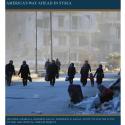 |
 |
America's Way Ahead in Syria: One Pager
Mar 15, 2017 - ISW Press


- To protect American interests, President Trump’s goal cannot be a quick end to the war in Syria. He should instead set out to extricate the US from the constraints imposed by our dependence on unreliable partners, such as the Syrian-Kurdish People’s Defense Forces (YPG) and the Turks, who do not share our interests, and establish a strategy on America’s terms.
- The US must stop bringing a counterterrorism strategy to a counterinsurgency fight. America has been waging a counterterrorism campaign by proxy while al Qaeda and the Islamic State of Iraq and al Sham (ISIS) have been conducting population-centric insurgencies that gain control by taking advantage of popular grievances. The US must first develop a population-centric counterinsurgency strategy of its own in Syria and then determine what kind of American forces might be required to implement this new approach.
- Current US strategy empowers al Qaeda. The US has prioritized defeating ISIS before turning to al Qaeda. This has allowed al Qaeda to strengthen its own insurgency in the background. Al Qaeda is preparing itself to reconsolidate control over the global Salafi-jihadi movement when ISIS is defeated. It has even amassed an army in northern Syria.
- Iran’s strategy in Syria is designed to prevent America from protecting its interests. Iran is doing so with a functioning, interoperable, and deployable coalition of its proxies and with Russia’s help. The Russo-Iranian coalition will disrupt America’s ability to respond to terror threats against it in the region, defend key allies such as Israel, and ensure unfettered access to trade routes on which the US economy depends.
- US leadership is needed to drive a multinational strategy that rallies regional powers capable of building the moderate Sunni Arab resistance essential to defeating the ISIS and al Qaeda insurgencies. Turkey supports the al Qaeda–penetrated Ahrar al Sham. Saudi Arabia and the United Arab Emirates are embroiled in Yemen and have given up on the idea of a moderate opposition in Syria. Jordan faces a major internal Salafi-jihadi threat, draining its already limited resources. As a result, the US must assist in creating a new political-security system that the Sunni Arab community can help defend against jihadists. Without such a system, any battlefield success will be temporary at best.
- The US must act soon in Syria if it hopes to destroy ISIS and al Qaeda and prevent their reconstitution. The first phase of a series of multiphase campaigns should prioritize seizing and securing a base of operations in southeastern Syria to create a de facto safe zone in the region. Success will depend on US forces fighting alongside, recruiting, and training local Sunni Arab forces to conduct an immediate offensive against ISIS and future operations against al Qaeda. Subsequent phases will require establishing a no-fly zone in southern Syria and pressuring the Assad regime and its backers to concede to a negotiated settlement acceptable to all of Syria’s population groups.